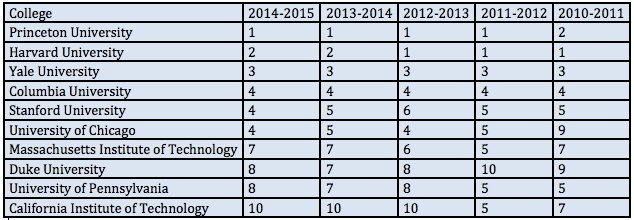In their newest college scoreboard, U.S. News & World Report placed Princeton at the top, Harvard next, and Yale #3 for the best national universities. Next, I could not resist checking out the “Best Undergraduate Teaching” and found Princeton (#1), William and Mary (#2), and Miami U at Oxford (#3). As for business schools, the top three grad programs are at Harvard, Stanford and University of Pennsylvania’s Wharton.
You can see below the national universities ranking for the past four years:

False Precision
I wonder if we are dealing with false precision. After all, whether looking at colleges or best dressed movie stars or GDP, ranking has to be totally subjective. It all depends on the variables you select, their weight, how you quantify them, your time frame and much more. For the best undergraduate teaching schools, U.S. News & World Report just asked college presidents, deans and provosts. They called it a “peer assessment” survey.
In an especially excellent 2005 Atlantic article, former Reed College president Colin Diver, detailed the impact of the U.S. News results. Summarizing the downside of ranking while explaining why Reed refused to participate in the process, he took me to a slew of unintended consequences that included an “irresistible pressure toward homogeneity” and the temptation to elevate scores by changing institutional procedures. Meanwhile, he marveled at the quantity of brochures he received from schools hoping to influence the reputational survey he completed annually when he did participate as the Dean of Penn Law.
By contrast, other critics looked at the surveys themselves. In a 2011 New Yorker article, journalist Malcolm Gladwell showed how survey questions reflect the perspective of the designer and skew the results. Focusing on graduate business school ranking by five magazines, one Forbes writer perfectly illustrated how different questions generate varied results. In one example he explains that Forbes uses the financial gain of graduates after five years as a ranking variable for graduate business schools while U.S. News uses starting salaries. And yet both say they are determining which business school is best.
Our Bottom Line: Human Capital
Just like we add to physical capital with new machinery, human capital increases with more education. But where we can best increase our stock of human capital is not as easy to figure out.






